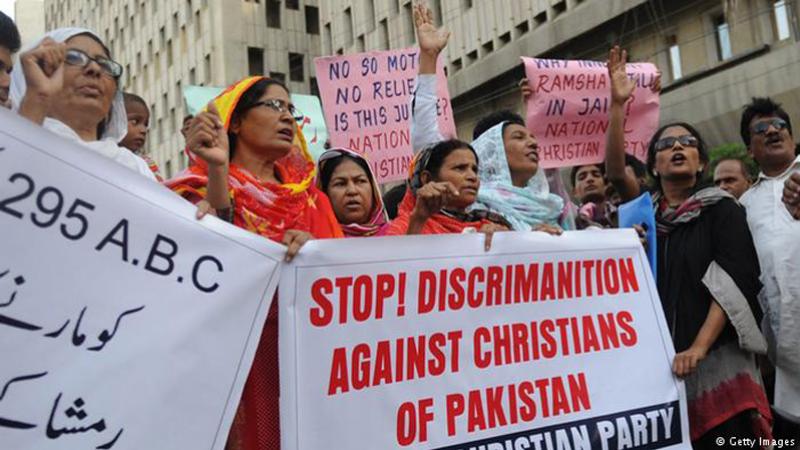
By Junaid Qaiser
Christians in Pakistan face systemic persecution and discrimination, making their situation increasingly precarious. As one of the largest religious minorities in a predominantly Muslim country, Christians endure marginalization in all aspects of life, from legal challenges to daily social discrimination. The worsening situation has drawn the attention of human rights organizations globally, yet meaningful change remains elusive.
Blasphemy Laws
One of the primary drivers of persecution against Christians in Pakistan is the country’s blasphemy laws. These laws, particularly Section 295-C of the Pakistan Penal Code, prescribe the death penalty for any insult to Islam or the Prophet Muhammad. While intended to protect religious sentiments, they are frequently used to target Christians and other religious minorities. Even an accusation, often made over personal disputes or land conflicts, can lead to violent mob attacks, imprisonment, and even death.
High-profile cases, such as that of Asia Bibi, a Christian woman sentenced to death on false blasphemy charges and later acquitted after spending nearly a decade on death row, highlight the dangers Christians face. Despite her acquittal, Asia Bibi and her family had to flee the country due to death threats from extremists, demonstrating how the law continues to intimidate the Christian community.
Mob Violence and Attacks
Christians frequently become the victims of mob violence, often spurred by accusations of blasphemy or religious discord. In numerous cases, mobs have attacked Christian villages, homes, and churches with little or no intervention from the authorities. For example, in Joseph Colony (Lahore, 2013), hundreds of Christian homes were burned down after a false blasphemy accusation against a Christian resident. Similar violent incidents have occurred in Gojra, Kasur, and most recently in Jaranwala (Faisalabad, 2023), where Christian churches and homes were torched after blasphemy allegations surfaced.
These attacks often go unpunished, with little justice for the victims. The lack of accountability emboldens extremists and leaves Christians vulnerable, living in fear of future violence.
Discrimination in Daily Life
Beyond violence, Christians face severe social discrimination in education, employment, and public life. Many Christians, especially those from lower-income backgrounds, are forced into low-paying, menial jobs such as sanitation work, reinforcing their marginalized status in society. Discriminatory hiring practices limit their opportunities for advancement, and Christian children are often ridiculed or ostracized in schools.
Christians are also systematically excluded from influential positions in politics and governance. Although there are reserved seats for minorities in provincial and national assemblies, these representatives have little real power or influence over decision-making processes. Furthermore, Christians are often overlooked for government programs and social services that could help uplift their communities.
Forced Conversions and Abductions
The forced conversion of Christian women and girls to Islam is another grave issue. Many young Christian girls, particularly from poor families, are abducted, forcibly converted to Islam, and married off to Muslim men. The families of these victims often face immense difficulty in seeking justice, as courts frequently side with the perpetrators, claiming that the conversions were voluntary.
High-profile cases, such as that of Huma Younus and Maira Shahbaz, where young Christian girls were abducted and forced into marriage, have drawn international attention. However, local authorities are often reluctant to intervene, fearing backlash from religious groups.
Lack of Legal Protection
The legal system in Pakistan offers little protection for Christians, and the police and judicial systems are often biased against minorities. Christians facing persecution have limited avenues to seek justice, and in many cases, legal proceedings are delayed or unfairly dismissed.
In many instances, Christian families flee their homes, seeking refuge in other parts of the country or abroad. However, emigration is not a feasible option for the vast majority of Christians, who lack the financial resources or international support needed to relocate.
International Concerns
International human rights organizations, such as Amnesty International, Human Rights Watch, and Open Doors, have repeatedly called attention to the worsening plight of Christians in Pakistan. However, the Pakistani government has been slow to address these concerns, often citing the influence of religious extremist groups and societal pressures as obstacles to reform.
In recent years, the European Union and United States have exerted pressure on Pakistan to improve the conditions of its religious minorities, linking aid and trade agreements to human rights reforms. While this has led to some token gestures, such as the release of high-profile Christian prisoners, the overall situation remains dire.
Conclusion
The situation for Christians in Pakistan continues to worsen, as they face persecution, violence, forced conversions, and legal discrimination on an almost daily basis. The misuse of blasphemy laws, lack of legal protection, and increasing extremism have created an environment of fear and insecurity for this marginalized community. Without significant legal reforms and societal change, the future remains bleak for Christians in Pakistan, as they continue to struggle for basic rights and protections.